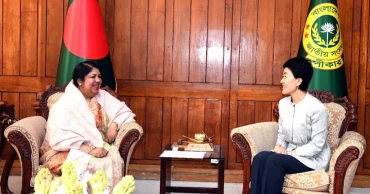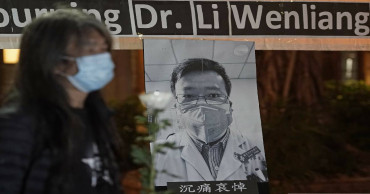Chinese Communist Party
BNP delegation set visit China at Chinese Communist Party’s invitation
A four-member BNP delegation is set to travel to China in early November at the invitation of the Chinese Communist Party (CCP).
The delegation will participate in a programmme scheduled to be held in Beijing from November 7 to 16, said BNP Organising Secretary Anindya Islam Amit.
The delegation comprises BNP Vice Chairman Asaduzzaman Ripon, Senior Joint Secretary General Ruhul Kabir Rizvi, Organising Secretary Anindya Islam Amit, and Jatiyatabadi Krishak Dal Joint Secretary Mahmuda Habiba.
A letter signed by BNP Secretary General Mirza Fakhrul Islam Alamgir said an event titled "Political Party Plus" Cooperation will be held in China’s capital Beijing with representatives from Southeast and South Asian countries.
It also said the Communist Party of China has invited BNP and other political leaders from around the world to take part in the event.
1 year ago
Chinese Communist Party leader Sun Haiyan meets Speaker Shirin Sharmin
Visiting Chinese Communist Party's Vice Minister of the International Department Sun Haiyan paid a courtesy call on Speaker of Bangladesh National Parliament Dr Shirin Sharmin Chaudhury in the city on Thursday.
During the meeting held at the Speaker’s office here, they discussed different issues including bilateral friendship, trade and business, Rohingya, Bangabandhu’s visit to China and parliamentary activities, said a press release.
India to work together with Bangladesh to prevent wildlife trafficking: Environment Minister
The speaker said Bangladesh has a long-standing friendly relationship with China. This relationship can be strengthened further through formation of parliamentary friendship groups and exchange of parliamentary norms between the national parliaments of both countries, she said.
2 years ago
The Rise and Rise of Xi Jinping
Twice every decade delegates from every nook and corner of country representing the Chinese Communist Party (CCP) gather in Beijing’s ‘Great Hall of the People’ not only to choose their leaders, but also their policies. This year two and a half thousand such persons, selected by the membership of the CCP currently numbering nearly a hundred million, will gather in Beijing for this purpose. The 16th of October (today) has been selected as the date for the 20th National Congress. While announcing the schedule last August, the official Xinhua news agency described it as “new journey to build a modern socialist country in an all-round way and marching towards the goal of a second century of struggle”. To many such language may appear characteristically platitudinous. But to any serious student of China’s politics, each expression should be read as what it really is, packed with meaning.
For instance, “a new journey” signals a deviation from the past which was marked by nearly untrammeled continuity of Deng Xiaoping’s pro-market policies; “a modern socialist country” implies a return to socialist values, but within a contemporary paradigm; “all round way” means the upcoming initiatives will be comprehensive; and “the goal of a second century of struggle” puts paid to any idea of the perception of a China pampered into passivity by domestic prosperity. So, while appearing to be circumlocutory and rambling the language of the Xinhua announcement was in reality terse and laconic. It was of a kind that would have done ancient Sparta proud. Mastering the substance and style of China’s messaging is in itself an art of politics the world is beginning to recognize, and take deep interest in.
Read:China’s Communist Party conference starts: Xi expected to receive a third term
For a variety of reasons there are many who would see these times as some of the more challenging for China in recent history. First there is the issue of Covid, which had its origin in that country, and the manner in which the authorities have chosen to address it, that is the ‘zero covid policy’. While it may have yielded desired results, the price is high. Local government budgets have come under enormous, and at times unsustainable, strain. There is a modicum of risk that it may provoke social discontent, and there already have been some evidence of it in some cities, including Shanghai.
Second is the state of the economy, in which some sectors appear beleaguered. An example is the real state, which comprises 29 per cent of the GDP, and which is obviously struggling. Around US $ 1 trillion has been lost to value of companies due to consumer-tech crackdown, resulting in investor nervousness. The many wealthy beneficiaries of liberalism are now unsurprisingly weary of the policy of ‘common prosperity’ and allied redistribution.
Read 'Taiwan question must be resolved by the Chinese': Xi says at 20th CPC Congress
The third is an external reason, having to do with the Ukraine War. Many were questioning the wisdom of the proximity to Russia, whose plans seemed to be going awry. Indeed, President Vladimir Putin’s plans seem to be unravelling in the battlefield, and there is no telling what he might do if pushed back really hard against the wall!
The above provide sufficient grist to the rumor mill. A story went around both in foreign mainstream and social media that a power struggle was on-going in China, and that a coup d’etat was on the cards. The rumour gained strength as Xi was indeed away from public view for a few days. But then he made an appearance to prove that the news of his political demise was most assuredly premature. On the contrary what is about to happen in the imminent National Congress is a massive endorsement of his policies. At a pre-session event, a senior functionary announced that the nation was looking to being led by “Xi Jinping Thought on Socialism with Chinese characteristics for a New Era”. Xi’s grip over state power seems unshakeable.
Read China says Ukraine crisis has sounded alarm for humanity
This has come about due to a number of clear achievements that can be credited to Xi. At the very outset he set for himself the target of lifting 100 million people out of poverty by 2021, and he succeeded in doing it. He went after corruption in a ruthless manner and did not spare friend or foe. He prioritized tackling severe air and water pollution which were the result of decades of unfettered development. His ‘three antis’ notched up notable successes: ‘anti-poverty’, ‘anti-corruption’, and ‘anti-pollution’. He sought to discipline China’s behemoth bureaucracy and better equip it to focus on the new policy-guidelines. He modernized the military, making it leaner and more agile. He used skill and authority, often adroitly combined, to discourage opponents, or even eliminate them from the political arena. In the end it is now all but certain that the National Congress will give him what he seeks, a third extension in office, unprecedented in recent Chinese history.
But the Chairman alone does not the Party make. To facilitate governance there is the Central Committee that the National Congress elects, which comprises around 370 members. At its top is the 25-member Politburo, at whose apex are 7 of them, called the Politburo Standing Committee (PSC). It is the SC that is at the pinnacle of power. In many parts of the world, age for politicians is just a number, but in China it is very often a tool for weeding out inconvenient ones. This is achieved through the so-called principle of “7 Up and 8 -Down”, a rule that has never been codified, but is universally respected. It runs as follows: at the start of a National Congress, officials who are aged less than 67 can be promoted, while those who are 68 or above are expected to be retired. This time we are likely to see some exceptions. There are at least two to whom the age- bar will not apply. Xi himself, and possibly the competent trade czar, Liu He. Premier Li Keqiang, who has not reached 68, will remain in the Standing Committee, but may leave Premiership next year to become head of Parliament. The number ‘7’ for the PSC membership is not sacrosanct. It can be altered in response to perceived needs. There is already some talk of the possible addition of an Army General this time round. Could it signal a preparatory step towards possible conflict on Taiwan?
Read: China's Xi expected to get third five-year term
Most certainly, Xi will emerge stronger with his endorsement for the third term after the 20th Congress. He will then be the President of the State, General Secretary of the Party, and the Chief of the armed Forces. The moniker “Chairman of Everything” is undoubtedly an exaggeration, but it is also suggestive. It is possible, though not necessarily probable, that such consolidation of power will allow him the confidence required to be more accommodative towards perceived adversaries, like India and the United States; or the scope to rein in the protagonists in the Ukraine War from plunging the world into a nuclear Armageddon; or the wherewithal to urge calm upon North Korea, restraining it from the relentless, and dangerous, pursuit of missile testing. But for this he will require a degree of international empathy for him that would have to be sufficiently encouraging.
He is likely to continue his domestic course-correction to curb the excesses of the post-Deng Xiaoping’s policies that have widened the rich-poor gulf. Through the “dual circulation” strategy attempts will be made to stimulate domestic economy and try reducing external dependence. Growth will be adjusted downwards in favor of redistribution, and the creation of more equitable society. To achieve those goals a more powerful State is likely.
Read China looks to learn from Russian failures in Ukraine
But Xi Jinping will need to be careful as so as not to take control to the point of snuffing out initiative. The challenge will be to find the appropriate equilibrium if his Zhang Guomeng or ‘China dream’ is to find fruition, and he is to leave behind a worthwhile historical legacy.
Dr Iftekhar Ahmed Chowdhury is the Honorary Fellow at the Institute of South Asia Studies, NUS. He is a former Foreign Advisor (Foreign Minister) of Bangladesh and President & Distinguished Fellow of Cosmos Foundation. The views addressed in the article are his own. He can be reached at: isasiac @nus.edu.sg
3 years ago
Chinese citizens support Xi's hard-line policy against Hong Kong
Many Chinese citizens on the mainland have apparently provided positive support for the Communist Party's hard-line policy against Hong Kong, further jeopardizing democracy, freedom and human rights in the former British colony.
4 years ago
China urged to trace virus before promoting 'vaccine diplomacy'
Calls are growing for China to take adequate responsibility to identify the origins of the novel coronavirus, first detected in its central city of Wuhan, before trying to boost its global clout through "vaccine diplomacy."
5 years ago
UK pulls license of Chinese state-owned broadcaster CGTN
United Kingdom regulators have pulled the broadcasting license for China Global Television Network (CGTN).
5 years ago
Pompeo says China's policies on Muslims amount to 'genocide'
On his way out the door, Secretary of State Mike Pompeo lashed out anew at China on Tuesday by declaring that its policies on Muslims and ethnic minorities in the western Xinjiang region constitute “crimes against humanity” and a “genocide.” The rarely used designation is sure to provoke an angry response from Beijing.
5 years ago
Xi critic jailed for 18 years in graft case
The former chairman of a state-owned real estate company who publicly criticised President Xi Jinping’s handling of the coronavirus pandemic was sentenced to 18 years in prison on Tuesday on corruption charges, a court announced.
5 years ago
Trump signs bill, order rebuking China
President Donald Trump signed legislation and an executive order on Tuesday that he said will hold China accountable for its oppressive actions against the people of Hong Kong.
5 years ago
Coronavirus death toll rises to 722
The number of confirmed cases of the new virus has risen again in China while fatalities increased to 722 on Saturday, as the ruling Communist Party faced anger and recriminations from the public over the death of a doctor who was threatened by police after trying to sound the alarm about the disease over a month ago.
6 years ago



.jpg)
.jpg)


.jpg)
.jpg)




